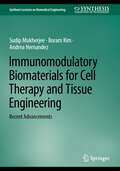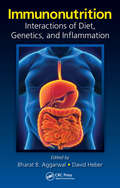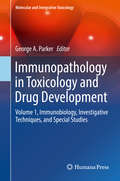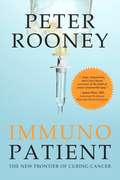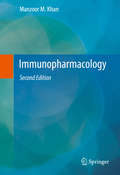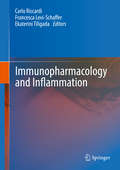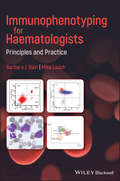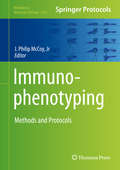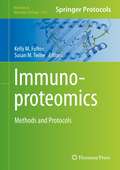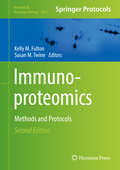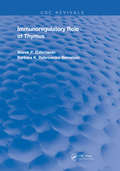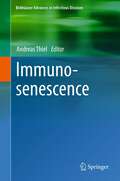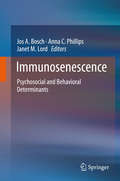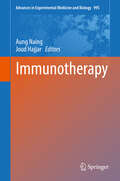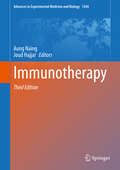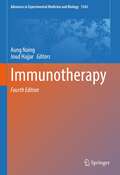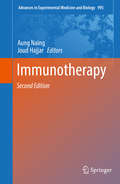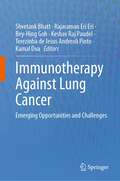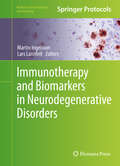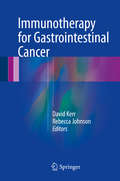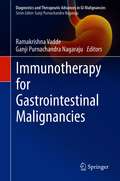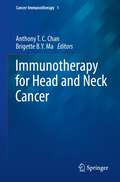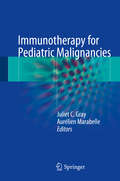- Table View
- List View
Immunomodulatory Biomaterials for Cell Therapy and Tissue Engineering: Recent Advancements (Synthesis Lectures on Biomedical Engineering)
by Sudip Mukherjee Boram Kim Andrea HernandezThis book presents the recent developments in immunomodulatory biomaterials for cell-based therapies in various diseases, including diabetes, cancer, cardiovascular disease, and bone regeneration. The authors first cover the fundamentals of conventional immunology and immunomodulation, before focusing on the history, advantages, and challenges of cell therapies. Biological cell therapy has gained immense attention for various diseases due to unique advantages it has over chemical drugs regarding cost, ease of production, toxicity, and therapeutic efficacy. However, these cell-based therapies need an inert delivery system that can locally deliver cells and minimally elicit foreign body response. The book discusses the foreign body response to the immunomodulatory biomaterials as well as the current and future strategies for potential mitigation of considerable immune responses toward immunomodulatory biomaterials and devices.
Immunonutrition: Interactions of Diet, Genetics, and Inflammation
by David Heber Bharat B. AggarwalThe interaction of immune function and nutrition underlies the low-grade chronic inflammation involved in the etiology of many common obesity-associated and age-related chronic disease conditions. This close interaction is the genesis of the term immunonutrition, which represents a new interdisciplinary field of nutritional and medical research. Im
Immunopathology in Toxicology and Drug Development
by George A. ParkerThis book provides a fundamental understanding of immunopathology and immunopathologic processes, with particular attention to nonclinical toxicology studies. Chapters provide organ system-based summaries of spontaneous pathology and common responses to xenobiotics. A companion volume, Immunopathology in Toxicology and Drug Development: Volume 1, Immunobiology, Investigative Techniques, and Special Studies, offers an overview of general immunobiology, cells of the immune system, signaling and effector molecules, and immunopathology assays. These informative and strategic books were created in response to the large segment of drug development that focuses on chronic diseases, many of which involve alterations to the immune system. Therapies that target these diseases commonly involve some form of immunomodulation. As a result, the two volumes of Immunopathology in Toxicology and Drug Development are critical texts for individuals involved in diverse aspects of drug development. Readers will acquire a thorough understanding of immunopathology for detection and accurate interpretation of pathologic effects of xenobiotics on the immune system.
Immunopathology in Toxicology and Drug Development
by George A. ParkerThis book provides a fundamental understanding of immunopathology and immunopathologic processes, with particular attention to nonclinical toxicology studies. Chapters provide an overview of general immunobiology, cells of the immune system, signaling and effector molecules, and immunopathology assays. A companion volume, Immunopathology in Toxicology and Drug Development: Volume 2, Organ Systems, offers summaries of organ-specific immunobiology and immunopathology as well as common responses to xenobiotics. These informative and strategic books were created in response to the large segment of drug development that focuses on chronic diseases, many of which involve alterations to the immune system. Therapies that target these diseases commonly involve some form of immunomodulation. As a result, the two volumes of Immunopathology in Toxicology and Drug Development are critical texts for individuals involved in diverse aspects of drug development. Readers will acquire a thorough understanding of immunopathology for detection and accurate interpretation of pathologic effects of xenobiotics on the immune system.
Immunopatient: The New Frontier of Curing Cancer
by Peter RooneyWhen an X-ray of a sore arm quickly leads to a diagnosis of Stage IV kidney cancer—one which would soon affect his bones, his lungs, lymph nodes, and brain—Peter Rooney’s life will never be the same. Faced with the prognosis of an incurable disease and armed only with the will to fight back, Immunopatient chronicles Peter’s desperate quest for hope and healing, and the experimental treatment that will give him a chance to strike back at his disease. Detailing both the medical breakthroughs that provided Peter with cutting-edge treatment and his inspirational quest to conquer both his fear and his illness through mindfulness and positive visualization, Immunopatient is a gripping memoir, one that offers new hope to cancer patients everywhere to never give up looking for answers. Peter’s story, both humble and human, showcases the heights of medical science and the depths of human endurance, proving that anything is possible as long as you keep moving forward.
Immunopharmacology
by Manzoor M. KhanDuring the past decades, with the introduction of the recombinant DNA, hybridoma and transgenic technologies there has been an exponential evolution in understanding the pathogenesis, diagnosis and treatment of a large number of human diseases. The technologies are evident with the development of cytokines and monoclonal antibodies as therapeutic agents and the techniques used in gene therapy. Immunopharmacology is that area of biomedical sciences where immunology, pharmacology and pathology overlap. It concerns the pharmacological approach to the immune response in physiological as well as pathological events. This goals and objectives of this textbook are to emphasize the developments in immunology and pharmacology as they relate to the modulation of immune response. The information includes the pharmacology of cytokines, monoclonal antibodies, mechanism of action of immune-suppressive agents and their relevance in tissue transplantation, therapeutic strategies for the treatment of AIDS and the techniques employed in gene therapy. The book is intended for health care professional students and graduate students in pharmacology and immunology.
Immunopharmacology and Inflammation
by Ekaterini Tiligada Carlo Riccardi Francesca Levi-SchafferA comprehensive overview of the current research on inflammation and immunopharmacology, with particular attention to the use of anti-inflammatory drugs, this book discusses future trends in this area of pharmacological research. It addresses an audience with basic knowledge in the inflammatory process, immune system and pharmacology. The book meets the needs of graduate students, junior and senior researchers and is useful as a source of the most current information for those already working in these fields.
Immunophenotyping for Haematologists: Principles and Practice
by Mike Leach Barbara J. BainOffers clear and concise instruction on running, reporting and interpreting immunophenotyping studies Written by two well-known haematology educators and experts on the topic, Immunophenotyping for Haematologists contains an introduction to running, reporting and interpreting immunophenotyping studies. The book offers a unique approach to the topic by putting the focus on clinical and laboratory haematologists who are not routinely involved in running and reporting on immunophenotyping studies. Immunophenotyping using flow cytometry has become the method of choice in identifying and sorting cells within complex populations, for example, the analysis of immune or neoplastic cells in a blood sample. The text reviews the purpose and principles of immunophenotyping and includes an introduction and explanation of the principles and the role of immunophenotyping. The authors examine immunophenotypic characteristics of the disease groups commonly encountered and identify the features that differentiate malignant cells from normal cells. To enhance understanding, the book contains multiple choice and extended matching questions which integrates immunophenotyping with clinicopathological features and the results of other investigations to mimic everyday practice. This important book: Provides a concise introduction to running, reporting and interpreting immunophenotyping studies Contains a list of all the antibody specificities currently widely used in diagnosis and disease monitoring Presents an ideal reference for use in laboratories, including immunophenotyping laboratories Aids in the interpretation by covering immunophenotypic characteristics of commonly encountered disease groups Identifies the features that differentiate malignant cells from their normal counterparts Written for haematologists working in both laboratory and clinical haematology, Immunophenotyping for Haematologists is a much-needed reference for understanding and interpreting immunophenotyping studies.
Immunophenotyping: Methods and Protocols (Methods in Molecular Biology #2032)
by J. Philip McCoyThis volume presents the latest collection of immunophenotypic techniques and applications used in research and clinical settings. Chapters in this book cover topics such as constructions of high dimensions fluorescence and mass cytometry panels; fluorescence barcoding; using dried or lyophilized reagents; and immunophenotypic examples of specific cell types. The book concludes with a discussion on the critical roles of quality control and immunophenotyping in the clinical environment. Written in the highly successful Methods in Molecular Biology series format, chapters include introductions to their respective topics, lists of the necessary materials and reagents, step-by-step, readily reproducible laboratory protocols, and tips on troubleshooting and avoiding known pitfalls.Cutting-edge and comprehensive, Immunophenotyping: Methods and Protocols is a valuable resource for any researchers, clinician, or scientist interested in learning more about this evolving field.
Immunoproteomics: Methods and Protocols
by Kelly M. Fulton Susan M. TwineProviding current diverse approaches and techniques used to study the immunoproteome, Immunoproteomics: Methods and Protocols collects chapters from key researchers that deliver information to be used in diagnostics, disease progression, and vaccine correlates of protection analysis, to name but a few. This detailed volume includes techniques used for the study of the antibody targets of bacterial pathogens, viruses, and cancer, mass spectrometry-based approaches to characterize T-cell epitopes, chapters on detection and relative quantification of cytokines in serum, as well as in silico prediction of epitopes using sequence-based or modeling approaches. Written in the highly successful Methods in Molecular Biology series format, chapters include introductions to their respective topics, lists of the necessary materials and reagents, step-by-step, readily reproducible laboratory protocols, and tips on troubleshooting and avoiding known pitfalls. Practical and thorough, Immunoproteomics: Methods and Protocols aids researchers in transferring these techniques to their own laboratories in addition to providing a reference to guide researchers toward appropriate techniques.
Immunoproteomics: Methods and Protocols (Methods in Molecular Biology #2024)
by Kelly M. Fulton Susan M. TwineThis second edition volume expands on the previous edition with new sections describing the characterization of peptides bound to major histocompatibility complexes (MHC) on the surface of the cell. Chapters also cover topics such as using SERPA for antigen identification; antigen content of electroimmunoprecipitates; whole genome-phage display libraries; antigens in immune complexes; and immunoproteomic biomarkers. Written in the highly successful Methods in Molecular Biology series format, chapters include introductions to their respective topics, lists of the necessary materials and reagents, step-by-step, readily reproducible laboratory protocols, and tips on troubleshooting and avoiding known pitfalls. Cutting-edge and thorough, Immunoprotemics: Methods and Protocols, Second Edition is a valuable resource that presents novice and expert researchers with techniques that are easily transferrable to laboratories and provides enhanced hands-on insights into this evolving field.
Immunoregulatory Role of Thymus (Routledge Revivals)
by Marek P. Dabrowski B. Dabrowska-BernsteinFirst published in 1990. This important new text covers a wide area of thymology in both the theoretical and practical aspects. In view of current information, a crucial role of endocrine thymus is presented in the creation, maintenance, and senescence of neuro-endocrine-immune homeostasis. In particular, mechanisms are described (which are basically responsible for the T cell maturation and selection) for the hierarchic organization of the immune system and its thymic dependent immune competence in terms of tolerance and immunity. A detailed presentation of the structure and biological properties of a number of well-defined thymic hormones is included. Their clinical applications and results obtained in inherited or acquired immunodeficiencies and in neoplasmic diseases are also reviewed on the grounds of numerous representative clinical trials. A perspective and potential scope of immunorestorative therapy and prevention with thymic hormones and other thymomimetic drugs are outlined. Researchers, practitioners, and students will find this book to be a useful and essential source of information.
Immunosenescence
by Andreas ThielAs individuals age, their ability to respond to and clear pathogens and to control unwanted immune reactions declines, leading to a greater incidence of certain infectious diseases, autoimmunity and general immune dysfunctions. Most remarkably, the efficacy of vaccines is frequently decreased in elderly persons. Therefore, age-associated dysfunctions of the humoral and cellular immune responses have a strong clinical impact. Improving our understanding of the aged immune system is crucial in developing effective prevention and treatment programs that will facilitate healthy aging and improve the quality of life of the elderly population. The aim of this volume is to summarize current knowledge on the cellular and molecular aspects of the aging immune system, with an emphasis on infectious diseases and new therapeutic approaches.
Immunosenescence
by Jos A. Bosch Anna C. Phillips Janet M. LordImmunosenescence is a unique, multi-disciplinary approach to the understanding of immune aging. It addresses the topic from the biological, as well as the psychological, social and behavioral perspectives. It is, thus, a valuable and timely addition to the literature in this area. Contributors include experts in the field, reviewing the state of the art in research.
Immunotherapy
by Aung Naing Joud HajjarIn the last decade, immunotherapy has revolutionized the practice of medicine in the field of oncology. This book, Immunotherapy, highlights the immunotherapeutic approaches currently in use and strategies to overcome the associated challenges. As comprehensive knowledge of basic immunology in the context of tumor biology is required to move further along the line of development in translational science, this book provides an overview of the cellular components of the immune system that interact with each other to provide a successful immune response. Immunotherapy offers promising antitumor activity across multiple cancer types as it does not attack the tumor but primarily revitalizes a suppressed immune system. It is beyond the scope of this book to discuss the immunotherapeutic approaches across the tumor board. However, the book features the role of immune-oncology in acute myeloid leukemia, non-small cell lung cancer, and sarcomas to showcase the recent advances in the management of cancer broadly classified as hematological malignancies, solid tumors, and tumors arising in the connective tissue. The book also discusses alternative formulations and combinatorial approaches to enhance the therapeutic index of these agents. As immunotherapeutic agents differ significantly from chemotherapeutic agents in response patterns and toxicity profiles, evaluating their safety and efficacy in clinical trials remains a challenge. In this book, we discuss the use of a variety of traditional and new immunotherapy criteria to evaluate response, their inadequacies, and clinical implications. The book also outlines how recent advances in medical imaging technology have the potential to provide high-dimensional data to improve decision support and individualize treatment selection and monitoring. Importantly, the book attempts to increase the awareness to immune related adverse events and the need for aggressive and judicious management of toxicities to improve treatment outcomes in patients on immunotherapy In short, this book provides a broad understanding of immunotherapy and ways to leverage the immune system to make inroads in the fight against cancer.
Immunotherapy (Advances in Experimental Medicine and Biology #1244)
by Aung Naing Joud HajjarImmunotherapy is a rapidly evolving field that mandates frequent revision of the book as new insights to fight cancer emerge. The third edition of Immunotherapy is an updated overview of immuno-oncology in different cancer types and toxicities associated with immunotherapy. It explores the breath of immunotherapeutic strategies available to treat a wide range of cancers, from melanoma and non-small cell lung cancer to gastrointestinal, genitourinary, gynecologic and nervous system malignancies. With increasing use of checkpoint inhibitors as standard of care and in clinical trials, the challenges associated with their use undoubtedly increase. As objective response is limited to a subset of patients and is often associated with distinct immune related side effects that are potentially life threatening, it is essential to identify patients who are likely to respond to immunotherapy and those who are at a risk for developing treatment-related side effects. In the absence of a validated predictive biomarker, innovative technologies and assays are being used to identify critical biomarkers that drive the immune response. Hence, a chapter to provide a basic understanding of the diagnostic procedures has been included besides the chapter on the cellular components of the human immune system. This new edition will also inform readers on use of novel microbiome and imaging approaches. Finally, the book includes a chapter on patient-reported outcomes in patients treated with immunotherapies as the authors recognize the importance of including missing patient voice in clinical trials and longitudinal assessment of symptom reports. In short, the third edition of this book provides a comprehensive overview of the latest developments in the field of immune-oncology that will help health care professionals make informed treatment decisions. The book’s chapters are written by a diverse cast of experts conducting cutting-edge research, providing the reader with the most up-to-date science.
Immunotherapy (Advances in Experimental Medicine and Biology #1342)
by Aung Naing Joud HajjarThe field of immuno-oncology continues to rapidly evolve as new insights to fight and treat cancer emerge. The fourth edition of Immunotherapy provides the most current overview of immuno-oncology in different cancer types and toxicities associated with immunotherapy. While immunotherapy has revolutionized the treatment landscape of several solid malignancies, several challenges still exist.Only a subset of patients derive clinical benefits; some do not respond at all, and others respond initially, only for their disease to progress later. Because these drugs can activate a broad range of immune cells, patients suffer from a unique set of side effects known as immune-related adverse events. As more immunotherapeutic agents are used in the clinic, it is important to provide updates about current and ongoing developments in the field to further research efforts and inform treatment decisions.The fourth edition will have a new focus on strategies to overcome the challenges associated with immunotherapy. Chapters will discuss topics such as biomarkers of response, resistance mechanisms, role of imaging in predicting immune-related adverse events, and management of immune-related adverse events. Written by leading experts conducting cutting-edge research, readers will gain up-to-date knowledge on the current state and future of immunotherapy.
Immunotherapy (Advances in Experimental Medicine and Biology #995)
by Aung Naing Joud HajjarThe second edition of Immunotherapy is an updated overview of immuno-oncology in acute myleloid leukemia, non-small cell lung cancer and sarcomas, showcasing advances in the management of cancer broadly classified as hematological malignancies, solid tumors and tumors arising in the connective tissue. Scientists, oncologists and advanced students will be provided with knowledge of basic immunology in the context of tumor biology, providing a comprehensive overview of the cellular components of the immune system that interact with each other to provide a successful immune response. A number of new, scientific findings in his fast moving field have necessitated a thoroughly updated and revised edition including the use of immunotherapy for gastrointestinal and genitourinary cancers, as well as discussions on optimizing radiotherapy with immunotherapeutic approaches, biomarkers of response or resistance to immunotherapy, cancer imaging in immunotherapy, skin reactions to immune checkpoint inhibitors and more.As immunotherapeutic agents differ significantly from chemotherapeutic agents in response patterns and toxicity profiles, evaluating their safety and efficacy in clinical trials remains a challenge. The new edition will discuss the use of a variety of traditional and new immunotherapy criteria to evaluate response, their inadequacies and clinical implications. Additionally, the book will outline how new advances in medical imaging technology has the potential to provide high-dimensional data to improve decision support and individualize treatment selection and monitoring.Edited by two renowned experts in the field, the book’s chapters are written by a diverse cast of experts conducting cutting-edge research, providing the reader with the most up-to-date science.
Immunotherapy (Advances in Experimental Medicine and Biology #995)
by Aung Naing and Joud HajjarIn the last decade, immunotherapy has revolutionized the practice of medicine in the field of oncology. This book, Immunotherapy, highlights the immunotherapeutic approaches currently in use and strategies to overcome the associated challenges. As comprehensive knowledge of basic immunology in the context of tumor biology is required to move further along the line of development in translational science, this book provides an overview of the cellular components of the immune system that interact with each other to provide a successful immune response.Immunotherapy offers promising antitumor activity across multiple cancer types as it does not attack the tumor but primarily revitalizes a suppressed immune system. It is beyond the scope of this book to discuss the immunotherapeutic approaches across the tumor board. However, the book features the role of immune-oncology in acute myeloid leukemia, non-small cell lung cancer, and sarcomas to showcase the recent advances in the management of cancer broadly classified as hematological malignancies, solid tumors, and tumors arising in the connective tissue. The book also discusses alternative formulations and combinatorial approaches to enhance the therapeutic index of these agents.As immunotherapeutic agents differ significantly from chemotherapeutic agents in response patterns and toxicity profiles, evaluating their safety and efficacy in clinical trials remains a challenge. In this book, we discuss the use of a variety of traditional and new immunotherapy criteria to evaluate response, their inadequacies, and clinical implications. The book also outlines how recent advances in medical imaging technology have the potential to provide high-dimensional data to improve decision support and individualize treatment selection and monitoring. Importantly, the book attempts to increase the awareness to immune related adverse events and the need for aggressive and judicious management of toxicities to improve treatment outcomes in patients on immunotherapy In short, this book provides a broad understanding of immunotherapy and ways to leverage the immune system to make inroads in the fight against cancer.
Immunotherapy Against Lung Cancer: Emerging Opportunities and Challenges
by Kamal Dua Shvetank Bhatt Terezinha de Jesus Andreoli Pinto Keshav Raj Paudel Rajaraman Eri Eri Bey-Hing GohThis book provides insight into the various immunotherapeutic approaches for the treatment of lung cancers. The chapters of the book discuss the detailed mechanisms of checkpoint inhibitors, co-stimulatory molecules, drugs working in the immunosuppressive environment, and various vaccines for lung cancer. A chapter of the book explores the recent applications of the oncolytic virus in lung cancer treatment and discusses the potential and direction of oncolytic virus-based therapeutic vaccines. The chapter also elucidates the current understanding of the role of Toll-Like Receptors (TLRs) in tumor progression, and the recent progress in utilizing TLR agonists as potential therapeutic agents in lung cancer treatment. Towards the end, the book reviews the applications of stereotactic body radiation therapy (SBRT) and immunotherapy for the treatment of lung cancer. This book provides useful information to a range of audiences including clinical researchers working in the field of lung cancer, and undergraduate and postgraduate students from various disciplines such as pharmacy, microbiology, immunology, pharmacology, biotechnology, and health sciences.
Immunotherapy and Biomarkers in Neurodegenerative Disorders
by Martin Ingelsson Lars LannfeltThis practical volume examines a number of topicsthat explore the current status of immunotherapy and diagnostic markers forneurodegenerative disorders. With a focus on Alzheimer's disease, the firstsections of the book examine immunotherapeutic approaches for theaforementioned disease as well as for Parkinson's disease and Huntington's disease,amongst others. The last section of the book covers the importance of biomarkertechniques to catch these diseases early enough for the treatments to be mostuseful. Written for the Methods inPharmacology and Toxicology series, this book contains the kind of detaileddescriptions and implementation advice that will offer a smooth transition intothe lab. Authoritative and useful, Immunotherapy and Biomarkers inNeurodegenerative Disorders aims to aid in the continued progress in thedevelopment of novel immune-based drugs and diagnostic tools for thesedevastating brain diseases.
Immunotherapy for Gastrointestinal Cancer
by Rebecca Johnson David KerrThis book is about the manipulation of the immune system as a therapeutic approach to gastrointestinal cancer and its clinical applications, exploring therapeutic approaches which might be taken under the broad banner of immunotherapy. Starting by introducing concepts of modern immunology, the clinical applications of immunotherapy are then discussed. The reader will learn about the three broad classes of immune therapeutic agents: cell-based treatment; antibody therapy; cytokine application and the key effector cells and mechanisms which might cause tumour rejection. The reverse side of this equation, the genetic and molecular mechanisms which the tumour can use to escape immune control and regulation, is also discussed. Through reviewing the most up-to-date evidence, this volume provides an overview of the important scientific lessons learned from past failure of immunotherapeutics in the clinic and highlights more positive recent data, coupled to practical guidelines for clinical usage. Written by a team of worldwide experts, this is an indispensable guide for medical oncologists, surgical oncologists, radiation therapists, pharmacists, oncology nurse specialists.
Immunotherapy for Gastrointestinal Malignancies (Diagnostics and Therapeutic Advances in GI Malignancies)
by Ganji Purnachandra Nagaraju Ramakrishna VaddeThis book reviews current immunotherapeutic strategies for gastrointestinal (GI) malignancies, including immune composition, immune checkpoint inhibitors, cell therapy, and peptide vaccines used to protect against esophageal, gastric, hepato-biliary, pancreatic and colorectal cancers. It also discusses the current challenges of using immunotherapy for the treatment of gastrointestinal malignancies. The book reviews highly sensitive and specific immunomarkers for the detection of GI malignancies, and examines therapeutic vaccines and the major cytokines involved in GI immunotherapy, as well as their basic biology and clinical applications. In closing, the book explores various aspects of computational biology for the detection and treatment of GI malignancies.
Immunotherapy for Head and Neck Cancer (Cancer Immunotherapy #1)
by Anthony T. C. Chan Brigette B. Y. MaThis book is a comprehensive summary of the literature on the scientific rationale and clinical development of immunotherapy for head and neck cancers.Head and neck cancer is a biologically diverse group of cancers that bear a common hallmark - evasion of host immune surveillance through innate or acquired mechanisms. The etiological association between the Human Papilloma virus (HPV) and some squamous head and neck cancers, the Epstein-Barr virus (EBV) and nasopharyngeal cancer has provided further impetus for evaluating immunotherapy in this group of cancers. The successful development of anti-programmed cell death protein-1 (PD-1)/ ligand (PD-L1) and CTLA-4 antibodies in solid tumours has gradually brought immunotherapy into mainstream oncological practice in recent years. Besides immune-checkpoint proteins inhibitors, other forms of immunotherapy such as vaccines, EBV or HPV-targeting therapies and cellular therapies are actively being investigated in clinical trials, either alone or in combination with other conventional treatments such as radiotherapy, chemotherapy and surgery. In clinical setting, the practicing oncologist need to be familiar with some unusual patterns of immunological response such as pseudo-progression and hyper-progression in patients with head and neck cancers who are undergoing treatment with immune-checkpoint inhibitors. Furthermore, the unique side effects of immune-checkpoint inhibitors such as autoimmune toxicities need to be recognized early and treated expediently. The development of biomarkers in predicting response to immune-checkpoint inhibitors has played pivotal roles in selecting patients for immunotherapy in practice or as an enrichment strategy in clinical trials. There are now emerging data on the clinical utility of biomarkers such as PD-L1 expression (Combined Positive Score), gene signatures and tumor mutational burden. This book is an invaluable companion to all those who are involved in research and clinical management of patients with head and neck cancers from any endemic regions.
Immunotherapy for Pediatric Malignancies
by Juliet C. Gray Aurélien MarabelleThis book provides a comprehensive overview of current immunotherapy strategies, and how these may be applicable to childhood cancers. The first part of the book reviews how the immune system recognizes cancer, and the various escape mechanisms allowing tumour growth. The importance of the tumor microenvironment and the challenges this may present to achieving effective immunotherapy are discussed. Monoclonal antibodies, cellular, cytokine and vaccine therapies are all comprehensively reviewed, with particular focus on their potential application to pediatric cancers. Practical aspects of delivering such therapies to children, likely toxicities and potential biomarkers are considered. Finally, consideration is given to how, in the longer term, such therapies may be combined with conventional therapies such as chemotherapy and radiotherapy. Edited by two distinguished pediatric oncologists with a collection of chapters from the most authoritative experts in cancer immunotherapy, this is an indispensable volume for pediatric oncologists and physicians working in childhood cancer care.
